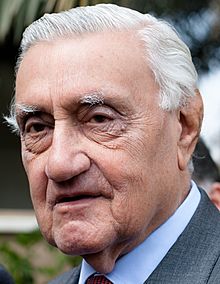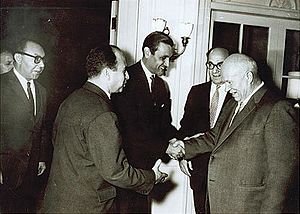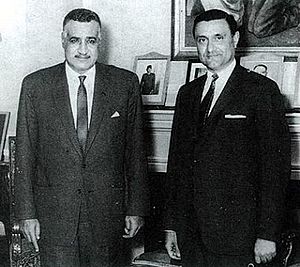Adnan Pachachi facts for kids
Quick facts for kids
Adnan Pachachi
عدنان الباجه جي |
|
|---|---|

Pachachi in March 2010
|
|
| Foreign Minister of Iraq | |
| In office 11 December 1965 – 10 July 1967 |
|
| Preceded by | Abd al-Rahman al-Bazzaz |
| Succeeded by | Ismail Khairallah (acting) |
| Personal details | |
| Born | 14 May 1923 Baghdad, Iraq |
| Died | 17 November 2019 (aged 96) Abu Dhabi, United Arab Emirates |
| Political party | Assembly of Independent Democrats |
| Alma mater | American University of Beirut |
Adnan al-Pachachi (Arabic: عدنان الباجه جي) was an important politician and diplomat from Iraq and the United Arab Emirates. He was born on May 14, 1923, and passed away on November 17, 2019.
Pachachi served as Iraq's main representative to the United Nations from 1959 to 1965. He was also Iraq's Foreign Minister from 1965 to 1967. After 1971, he lived outside Iraq and became a minister and advisor in the United Arab Emirates.
After the 2003 events in Iraq, Pachachi became a key figure in Iraqi politics. Many saw him as an experienced leader. He even turned down the chance to become president of the Iraqi Interim Government.

Contents
Early Life and Education
Adnan Pachachi was born in Baghdad, Iraq, on May 14, 1923. He came from a well-known family with a long history in Iraqi politics. His father and uncle were also important figures.
He studied at Victoria College, Alexandria in Egypt. Later, he went to the American University of Beirut in Lebanon. He graduated in 1943 with a degree in political science. While at university, he was interested in the idea of Arab unity.
After returning to Iraq, he wanted to work for the Ministry of Foreign Affairs. However, his application was initially turned down. This was because he had supported a youth group and a political change in 1941.
Working for Iraq
In 1950, Pachachi finally joined the Iraqi Ministry of Foreign Affairs. He worked there for eight years. He strongly supported Gamal Abdel Nasser, the leader of Egypt. Nasser believed in Arab unity. Pachachi admired Nasser and supported him during the Suez War in 1956.
Because of his strong support for Nasser, Pachachi was dismissed from his job in 1958. However, a day later, a revolution happened in Iraq. The old government was overthrown. The new government quickly appointed Pachachi as Iraq's Permanent Representative to the United Nations in 1959.
During his time at the UN, Iraq became close with the Soviet Union. Iraq also helped start the Non-Aligned Movement in 1961. This movement included countries that did not want to take sides in the Cold War. Pachachi met many world leaders as Iraq's representative. He also strongly argued for China to be included in the United Nations.

Pachachi wrote about his time at the UN in his book, Iraq's Voice at the United Nations: 1959-1969. He spoke about his strong support for the Palestinian people. In 1965, the Palestine Liberation Organization (PLO) gave him an award for his work.
In 1965, Pachachi became Iraq's Foreign Minister. He believed that Egypt's leader, Gamal Abdel Nasser, helped him get this job. In 1967, the Six-Day War broke out with Israel. Iraq stopped sending oil to the U.S. and banned U.S. goods. Pachachi called the ceasefire that ended the war a "complete surrender to Israel." He felt deeply sad about the Arab defeat.
He served as Iraq's UN representative again from 1967 to 1969. In 1968, a new political party came to power in Iraq. Pachachi resigned in 1969 because he did not agree with their values. He left Iraq in 1971.
Life and Work in the UAE
After leaving Iraq, Adnan Pachachi moved to Abu Dhabi, which had just become independent. The leader, Sheikh Zayed, appointed Pachachi as a Minister of State in Abu Dhabi's first government. This was in 1971.
When the United Arab Emirates was formed in December 1971, Pachachi immediately went to New York. He helped the UAE apply to become a member of the United Nations. Because of his past experience, he knew many people at the UN. He worked to convince important countries not to block the UAE's application.
In 1973, the UAE and other Arab oil-producing countries stopped sending oil to some countries. This was because of support for Israel during the Yom Kippur War. Pachachi was chosen to explain Sheikh Zayed's message at a meeting in Europe. He said they wanted justice for Palestinians and for Israeli forces to leave Arab lands occupied in 1967.
Pachachi became a citizen of the UAE in 1974. He served on the boards of important companies and government groups in Abu Dhabi. He was a strong supporter of Arab nationalism.
Events After 2003
Pachachi was against the 2003 invasion of Iraq. He tried to help find a way to avoid the war. He even helped arrange an offer for Saddam Hussein to leave Iraq peacefully. However, the invasion still happened.
He refused to join a US-appointed leadership group in Iraq in early 2003. He also spoke out against the way contracts were given to US companies for rebuilding Iraq.
In July 2003, Pachachi agreed to join the Iraqi Governing Council. This council was set up to help govern Iraq after the invasion. In April 2004, he spoke out against actions taken by US forces in the city of Fallujah, calling them "illegal and totally unacceptable."
In June 2004, he was offered the position of President of the Iraqi Interim Government. But he turned it down. He said he refused because people might think he was chosen by the Americans. He wanted to protect his reputation and honor.
Political Activities After 2005
Pachachi formed a group of candidates called the Assembly of Independent Democrats. This group ran in Iraq's January 2005 election. Before the election, Pachachi said the United States was interfering by insisting on the election date. He and other leaders wanted to delay the election because of violence in the country.
In May 2005, he said the situation in Iraq was very serious. He mentioned poor security, lack of services, and corruption.
For the December 2005 elections, he was elected as a member of parliament. As the oldest member elected, Pachachi opened the first session of the Iraqi parliament in April 2005.
In the March 2010 election, Pachachi ran again. He was worried about the fairness of the election. He blamed the US invasion for the problems and divisions in Iraq. He said the Americans allowed a political system based on different groups, which caused problems.
Pachachi often said he regretted that Iraq and Syria did not unite. He believed they could have been a powerful force in the Middle East.
Awards
In 2016, Pachachi received the Abu Dhabi Awards. This is the highest award for civilians in the Emirate of Abu Dhabi. He received it for his many years of service.
Death
Adnan Pachachi passed away on November 17, 2019, in Abu Dhabi, United Arab Emirates.

